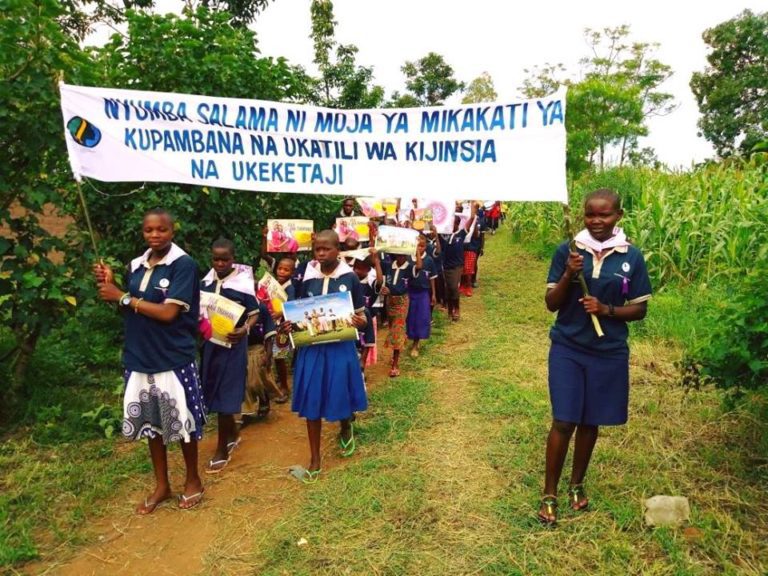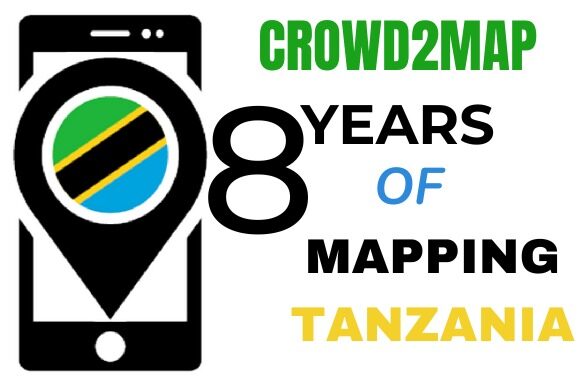“I first found out about the 16 Days Campaign when Rhobi Samwely organised a 16 Days March around Mugumu, Tanzania, in December 2015,” recounts Janet Chapman, Founder of Crowd2Map Tanzania. Rhobi opened the Mugumu Safe House in 2014 to provide safety and support to girls at risk for genital mutilation in Tanzania.
“This was the first ever 16 Days March in Mugumu, and it stirred a lot of interest – and bemusement – on the part of the locals,” Janet said. “About 200 girls marched around town singing ‘we want to be modern, uncut girls’ and demanding their rights. As it turned out, the March itself was stewarded by local police, and this was an enormous step forward in forming a cooperative relationship between the officers and the Mugumu Safe House staff and residents.”

Founded in 1991, the 16 Days of Activism campaign runs annually from November 25th (International Day for the Elimination of Violence Against Women) to December 10th (International Human Rights Day). The Campaign’s founding in 1991 followed, and commemorates, the December 6, 1989, deaths of 14 female students at the University of Montreal. Often referred to as the Montreal Massacre, it involved a male student who entered the University’s Engineering Department and after declaring his intent to kill feminists, he shot and killed the 14 students.
The theme of the 2019 Campaign – Ending Gender-Based Violence in the World of Work – reflects and celebrates the passage in 2019 of Convention 190 (C190) by the International Labour Organisation (ILO) to address gender-based violence in the working world. What is significant about C190 is that it is the ILO’s first Convention (which includes Recommendation 206 as guidance) to address sexual harassment and violence against women in the working world.
Will C190 change anything?
The ILO Conventions are a type of treaty that commits ratifying member nations to a specific course of action. Compliance is self-reported, and ILO conventions tend to act as benchmarks against which ratifying nation commits itself to strive toward.
Created in 1919 as part of the Treaty of Versailles, the ILO is a specialised United Nations agency, sometimes referred to as an international parliament of labour. It acts as a forum where social and labour questions are discussed and debated. In recent decades, ILO members have expressed concerns about poor working conditions in the global economy – where inequality and displacement of workers continues to increase.
Christine Lagarde, former Managing Director of the International Monetary Fund (IMF) and current head of the European Central Bank, said she made female empowerment a key goal for the IMF. “I didn’t see #MeToo coming but I welcome it immensely,” Lagarde said. “Sexual harassment is only scratching the surface. Violence against women is still a massive issue and we are not just talking about low-income countries: it is in all societies. It has to be discussed, addressed and fought against. There are some terrible things happening to women.”
One alternative that has been discussed is to incorporate ILO labour standards into the World Trade Organisation, where member nations could retaliate for unjust practices through trade sanctions.
Hiring more women helps drive economic growth
According to Lagarde, 88% of all countries in the world have legal restrictions against women in the workplace. “Some [nations] forbid women from doing specific jobs, 59 countries have no laws against sexual harassment in the workplace and there are 18 countries where women can be legally prevented from working,” she reports. A 2019 ILO report on global employment also cites the lack of progress in closing the gender gap in labour force participation – 48% female compared to 75% male.
The IMF is already pushing member nations to implement policies that empower women, Lagarde said, noting that women bring new skills to the workplace and help boost productivity – as well as workforce size. The empowerment of women results in “higher growth, a reduction in inequality, an improvement in the strength of the economy and a more diversified, export-focused country,” she reports.
Even advanced countries need improvement, she contends – the female workforce participation in such countries is still way below that of men, and the gender pay gap among developed countries is approximately 16%. But at the same time, some nations are making progress. Lagarde lauded Japan in particular for increasing its childcare budget, which takes some of the burden off working mothers.
To their credit, some nations have already addressed intimate partner violence by providing support for affected workers. In 2004, the Philippines became the first country to establish 10 days paid leave of absence for workers affected by domestic violence. New Zealand adopted a similar law in 2018. Collective bargaining agreements in countries such as Australia, Brazil, Canada, and the United Kingdom now provide paid leave and other entitlements to victims of domestic violence.
Addressing misconduct in the workplace
Prevention is about giving workers multiple options, such as offering a hotline, or an opportunity to speak with the personnel department or with their manager, according to labour lawyer Amy Oppenheimer. “If you are only providing employees one means of recourse, you’re inevitably deterring a big chunk of the workforce,” she said, adding that employers often need multiple tools for dealing with misconduct – such as bystander training, mediation and alternative dispute resolution, or training about communication and respect.
Sexual harassment is often triggered by an imbalance of power, so the emergence of women into leadership positions does make a difference. “When you have at least some women in leadership, there’s a very subtle but important cultural change that takes place, and it’s that kind of change that really is the foundation for eliminating sexual harassment,” reports Stephanie A. Scharf, chair of the American Bar Association’s Commission on Women in the Profession.
The following organisations focus on the promotion of women’s rights.
To volunteer, apply for an internship or a job, or to find services and support, contact any of the following:
BAOBAB for Women’s Human Rights. 323A, Muri Okunola Street, P.S. Box 73630, Victoria Island, Lagos, Nigeria. Tel: 234-1-262 6267. www.baobabwomenorg. Focused on women’s legal rights issues under customary, statutory and religious laws in Nigeria.
Center for Reproductive Rights. 199 Water Street, New York, NY 10038, 917-637-3600: www.reproductiverights.org. Nonprofit legal advocacy organization dedicated to promoting and defending women’s reproductive rights worldwide. Offices located in Washington DC; Bogota, Columbia; Nairobi, Kenya; Kathmandu, Nepal; and Geneva, Switzerland.
Equality Now. 125 Maiden Lane, 9th Floor, Suite B, New York, NY 10038. 212-586-1611. www.equalitynow.org. Committed to ending violence against women around the world. Offices in London UK and Nairobi, Kenya.
Federation of Women’s Lawyers Kenya (FIDA Kenya), P.O. Box 46324, Gitanga Road, Nairobi, Kenya. Tel: 722509760. www.fidakenya.org. Objective is to increase access to justice for women in Kenya and enhance pubic awareness of women’s rights.
Global Justice Center. 11 Hanover Square, 6th Floor, New York, NY 10005. Tel: 212-725-6530. www.globaljusticecenter.net. Lawyers and advocates who specialize in international law for the purpose of advancing gender equality and human rights.
International Rescue Committee. 122 East 42nd Street, New York, NY, 10168-1289. Tel: 212-551-3179. www.rescue.org. Providing assistance to people whose lives and livelihoods have been shattered by conflict and disaster.
Legal Momentum. 32 Broadway, Suite 1801, New York, NY 10004. Tel: 212-925-6635. www.legalmomentum.org. Legal advocacy organization dedicated to advancing the rights of women and girls. Programs focus on human trafficking, workplace equality, violence against women and girls, equal education opportunities, and fairness in the courts.
National Coalition Against Domestic Violence. 600 Grant, Suite 750, Denver, Colorado 80203. Tel: 303-839-1852. www.ncadv.org. Mission is to support efforts to demand a change in conditions leading to domestic violence, supporting survivors, and holding offenders accountable.
National Partnership for Women and Families. 1875 Connecticut Ave., NW, Suite 650, Washington, DC 20009. 202-986-2600. www.nationalpartnership.org. Advocates for women’s health, reproductive rights, and economic justice through policy research, participation in coalitions, and public education.
Pace Women’s Justice Center. 78 N. Broadway, White Plains, NY 10603. Tel: 914-422-4188. www.law.pace.edu/bwjc. Legal services for victims of domestic violence, sexual assault, and elder abuse.
UN Women. United Nations Secretariat, 405 East 42nd Street, New York, NY 10017-3599. www.unwomen.org. Mission is to develop and uphold standards and create an environment in which every woman and girl can exercise her human rights and live up to her potential. Liaison offices in Denmark, United Arab Emirates, Belgium, Ethiopia, United States, Japan, and Switzerland. Numerous regional office in Africa, Americas and Caribbean, Arab States, Asia and the Pacific, and Europe and Central Asia.
Women’s Initiatives for Gender Justice. Noordwal 10 2513 EA The Hague, The Netherlands. Tel: +31 (70) 302 9911. www.iccwomen.org. This office works with women most affected by conflict situations under investigation by the International Criminal Court (ICC). They advocate for accountability & prosecution of sexual and gender-based violence crimes and gender justice through the International Criminal Court (ICC) and domestic courts.
Women’s Refugee Commission. 15 West 37th Street, 9th Floor, New York, NY 10018. Tel: 212-551-3115. www.womenscommission.org. They work to improve the lives and protect the rights of women and children displaced by conflict and violence.
Women’s Legal Centre. 7th Floor Constitution House, 124 Adderley Str., Cape Town, South Africa. www.wice.co.za. Established by a group of women lawyers to advance women’s rights – particularly vulnerable and marginalised women – and to promote their access to justice and equitable resources.
Zimbabwe Lawyers for Human Rights. Kodzero/Amalungelo House, No. 103 Sam Nujoma (2nd) Street, Harare, Zimbabwe. www.zlhr.org. Mission is to protect and defend human rights through sustainable litigation, education and advocacy and help build a culture of tolerance and adherence to democratic values and practices.
Resources
Mugumu Safe House
16 Days of Activism
Convention 190
International Labour Organization
ILO Conventions
Treaty of Versailles
International Monetary Fund
European Central Bank
World Trade Organization
